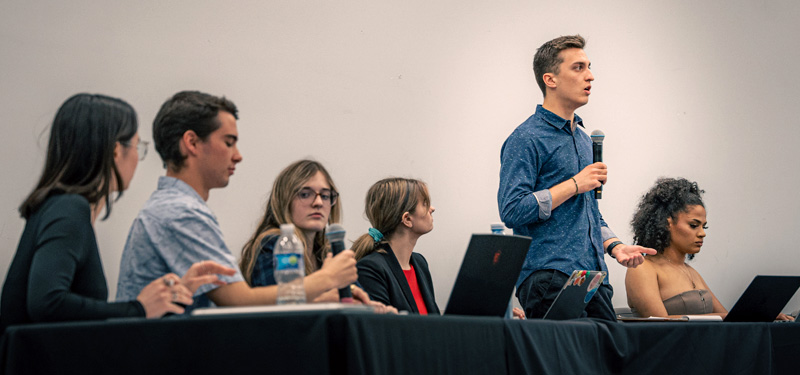
Overview
Our students and faculty produce scholarship that advances our knowledge of human communication, enhances the quality of public deliberation, and bridges the gap between our curriculum and real-world experiences. To serve these goals, LMU Communication Studies creates an environment where students and faculty pursue scholarship, community engagement, and leadership in civic, corporate, and international arenas.
Major Requirements
42 semester hours are required to complete a B.A. in Communication Studies. This is a combination of 12 semester hours of lower division courses, and 30 semester hours of upper division courses.
Minor Requirements
The PR minor requires completion of 7 courses and the DMCI minor requires completion of 6 courses.
For the most up-to-date and detailed listing of our course descriptions, as well as a sample 4-year plan, please visit our page on the LMU Bulletin site.
What to Expect
In particular, our program rigorously engages the following:
- Production and evaluation of communication messages
- Role of communication in shaping performance of identity and community
- Processes & technologies by which people relate to and collaborate
- Importance of principled advocacy across, personal, professional, public lives.
Throughout all aspects of our program, we encourage:
- Self-reflection and critical engagement with disciplinary subject matter and contemporary social and political events at the local and global level.
- Students and faculty to nurture personal habits of lifelong learning and service.
- Production of scholarship that advances our knowledge of human communication, enhances the quality of public deliberation, and bridges the gap between our curriculum and real-world experiences.
The Communication Studies Department serves these goals by:
- Creating an environment where students and faculty pursue applied education, scholarship, community engagement, and leadership in civic, corporate, and international arenas.
- Developing students' professional competencies to maximize their post-graduation opportunities for career development.
- Seeing professional development as a shared responsibility, where students are empowered to cultivate communication skills outside of the classroom through engaged forms of learning and professional development.